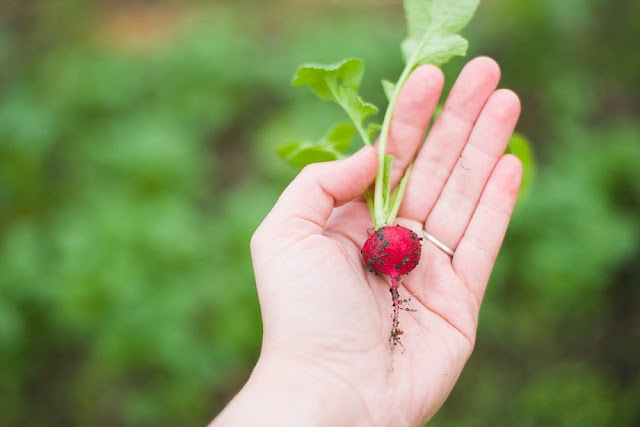 |
| Can Dogs Eat Radishes? Toxic and Dangerous Foods Your Dog Should Never Eat |
Can Dogs Eat Radishes? Toxic and Dangerous Foods Your Dog Should Never Eat
In this article, we will talk about radishes and their effects on a dog's health. If you are wondering if radishes are safe for your dog, you should read this article carefully. We will first tell you a little more about radishes, then you will discover if radishes are safe for your dog or if these vegetables can be harmful to your friend. We hope you enjoy this article.
Learn more about radishes
 |
| Can Dogs Eat Radishes? Toxic and Dangerous Foods Your Dog Should Never Eat |
Therefore, radishes have many benefits for human health and can also help to lose weight. But what about dogs? Can they also eat radishes or be harmful to dogs? Keep reading and you will discover.
Short Answer: Can Dogs Eat Radishes?
The answer is yes, dogs can eat radishes as a rare treat, but they are not recommended regularly for dogs. These vegetables do not appear to contain high concentrations of toxic substances for dogs. Even if Fido manages to devour the whole vegetable platter, do not panic. Still, there are other, much healthier plant options that you can share with your dog.
Can Dogs Eat Radishes? Toxic and Dangerous Foods Your Dog Should Never Eat
Read More: Can Dogs Eat Beets?
Health benefits of feeding your dog's radish
 |
| Can Dogs Eat Radishes? Toxic and Dangerous Foods Your Dog Should Never Eat |
What about these "redemption functions"? In terms of nutrition, there are two: radishes contain moderate amounts of fiber and antioxidants. Fiber, one of the greatest benefits of feeding your dog with vegetables, plays a unique role in the health of the whole body. Most of the foods that our dogs eat are valuable because of the vitamins and minerals they provide, but the fibers do not provide nutrients: the fibers are completely indigestible.
The indigestible plant fiber of radishes can be a powerful digestive aid. Unlike medications, fiber can fight both constipation and diarrhea. Dietary fiber breaks down diarrhea by giving more volume to loose or watery stools and allowing you to defecate more completely. However, the soluble fiber absorbs water and becomes a gelatinous substance. This can help bring water into the colon, making the stool softer, more even, and easier to cross.
Foods high in fiber and low in calories, such as radishes, can also be helpful in fighting obesity in dogs. Because the body can not digest fiber, it takes up a lot of room in the stomach without adding extra calories. Dietary fiber allows your dog to fill the stomach while consuming fewer calories. This means your dog can reduce caloric intake by eating moderately high fiber, high volume, and low-calorie vegetables without alleviating fasting hunger pains.
There is little research on the effects of dietary fiber on the long-term health of dogs, but it is possible to extrapolate from studies in humans and other animals. In these studies, fiber has been associated with decreased risk of insulin resistance, diabetes, heart disease, and colorectal cancer. Fiber is also thought to help stabilize blood sugar and prevent insulin spikes, which can be helpful for dogs who already have insulin resistance or diabetes.
Radishes also contain antioxidant vitamin C. Although dogs produce all the vitamin C they need to survive (and therefore do not need it in their diet), their antioxidant properties may offer some health benefits. Antioxidants protect dogs' health by destroying dangerous free radicals. These are charged particles that would be responsible for everything from cancer to heart disease and the usual symptoms related to age. By increasing the antioxidant intake of your dog, you can strengthen your dog's immune system, reduce the risk of chronic diseases or prolong the life of your dog. In other words, there are better sources of antioxidants than radishes, including fruits and leafy vegetables.
Read More: Can Dogs Eat Jerky?
Are radishes safe for dogs?
 |
| Can Dogs Eat Radishes? Toxic and Dangerous Foods Your Dog Should Never Eat |
Remember, not all dogs are the same. Some of them will not like this vegetable, so you should find another healthy gift for your dog. From time to time you should use radishes as a gift for your dog and not as an integral part of your diet. You can feed your dog with radish roots or radish sprouts, but you can also sprinkle some radish seeds on your dog's food. This is a healthy gift for your dog.
If you are feeding your dog with radish seeds, it is best to soak them for three hours, then drain them and pour them into a glass. It is necessary to rinse the radish seeds with water two or three times a day and then empty the water. In three days, the radish sprouts are ready to be eaten by your dog.
Remember that sprouted radish seeds provide your dog with natural plant proteins. However, this amount of protein is not enough for your dog. You also need protein of animal origin. Because of its high fiber content, radishes regulate your dog's digestion and your dog will have no problem with constipation.
Radishes are also rich in vitamin C and potassium, which is great for your dog's health. The rough texture of radish can also be used as a natural toothbrush for your dog, helping to remove plaque from his teeth.
Like all other vegetables, radishes should be slowly absorbed into your dog's diet. If your dog has a side effect, you must stop feeding him with radishes, and you should also find another healthy treatment that gives your dog all the nutrients needed.
But we have a warning for you. There are also wild radishes whose seeds are toxic to dogs. These wild radishes are white or yellow and have green leaves with dense hairs. If your dog is eating a wild radish flower, it should be brought to the veterinarian as soon as possible. Wild radishes can cause poisoning and even death.
Read More: Can Dogs Eat Jerky?
Things to keep in mind
 |
| Can Dogs Eat Radishes? Toxic and Dangerous Foods Your Dog Should Never Eat |
Summary
As you have seen in this article, you can feed your dog's radishes, but only as an occasional reward. Radishes and other vegetables should not be included regularly in your dog's diet. Your dog needs protein derived from animal sources. Therefore, all other foods should only be served as a gift.
But there are dogs that do not like these spicy vegetables. If your dog does not like these spicy vegetables, you can use broccoli, cauliflower or Brussels sprouts. It's also a great healthy gift for your dog.
However, do not forget that this food should not replace the special dog food. If your dog has unusual symptoms after eating radishes or other vegetables, it is recommended that you consult a veterinarian. He will tell you which food is best for your dog.
Final Thoughts
 |
| Can Dogs Eat Radishes? Toxic and Dangerous Foods Your Dog Should Never Eat |
Dogs Eat Radishes Video
Can Dogs Eat Radishes? Toxic and Dangerous Foods Your Dog Should Never Eat
Read More: Can Dogs Eat Peppers?

Comments
Post a Comment